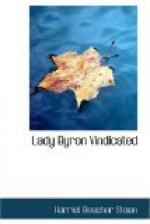II. March 29, 1816.—An attack on Lady Byron’s old governess for having been born poor, for being homely, and for having unduly influenced his wife against him; promising that her grave should be a fiery bed, etc.; also praising his wife’s perfect and remarkable truthfulness and discernment, that made it impossible for flattery to fool, or baseness blind her; but ascribing all his woes to her being fooled and blinded by this same governess. (Found its way to the prints by the imprudence of a friend.)
III. September 1816.—Lines on hearing that Lady Byron is ill. Calls her a Clytemnestra, who has secretly set assassins on her lord; says she is a mean, treacherous, deceitful liar, and has entirely departed from her early truth, and become the most unscrupulous and unprincipled of women. (Never printed till after Lord Byron’s death, but circulated privately among the ‘initiated.’)
IV. Aug. 9, 1817.—Gives to M. G. Lewis a paper for circulation among friends in England, stating that what he most wants is public investigation, which has always been denied him; and daring Lady Byron and her counsel to come out publicly. (Found in M. G. Lewis’s portfolio after his death; never heard of before, except among the ‘initiated.’)
Having given M. G. Lewis’s document time to work,—
January 1818.—Gives the Fourth Canto of ‘Childe Harold’ {51} to the public.
Jan. 25, 1819.—Sends to Murray to print for private circulation among the ‘initiated’ the First Canto of ‘Don Juan.’
Is nobly and severely rebuked for this insult to his wife by the ‘Blackwood,’ August 1819.
October 1819.—Gives Moore the manuscript ‘Autobiography,’ with leave to show it to whom he pleases, and print it after his death.
Oct. 29, 1819, Vol. IV. Letter 344.—Writes to Murray, that he may read all this ‘Autobiography,’ and show it to anybody he likes.
Dec. 10, 1819.—Writes to Murray on this article in ‘Blackwood’ against ‘Don Juan’ and himself, which he supposes written by Wilson; sends a complimentary message to Wilson, and asks him to read his ‘Autobiography’ sent by Moore. (Letter 350.)
March 15, 1820.—Writes and dedicates to I. Disraeli, Esq., a vindication of himself in reply to the ‘Blackwood’ on ‘Don Juan,’ containing an indignant defence of his own conduct in relation to his wife, and maintaining that he never yet has had an opportunity of knowing whereof he has been accused; accusing Sir S. Romilly of taking his retainer, and then going over to the adverse party, etc. (Printed for private circulation; to be found in the standard English edition of Murray, vol. ix. p.57.)
To this condensed account of Byron’s strategy we must add the crowning stroke of policy which transmitted this warfare to his friends, to be continued after his death.
During the last visit Moore made him in Italy, and just before Byron presented to him his ‘Autobiography,’ the following scene occurred, as narrated by Moore (vol. iv. p.221):—




